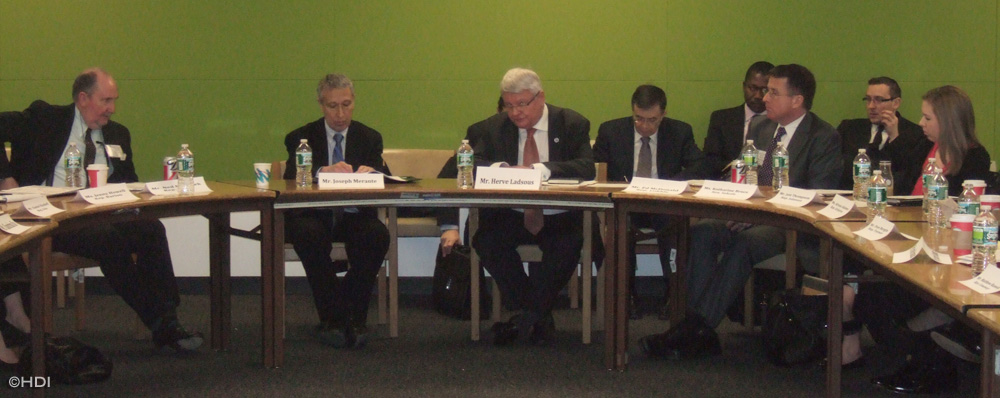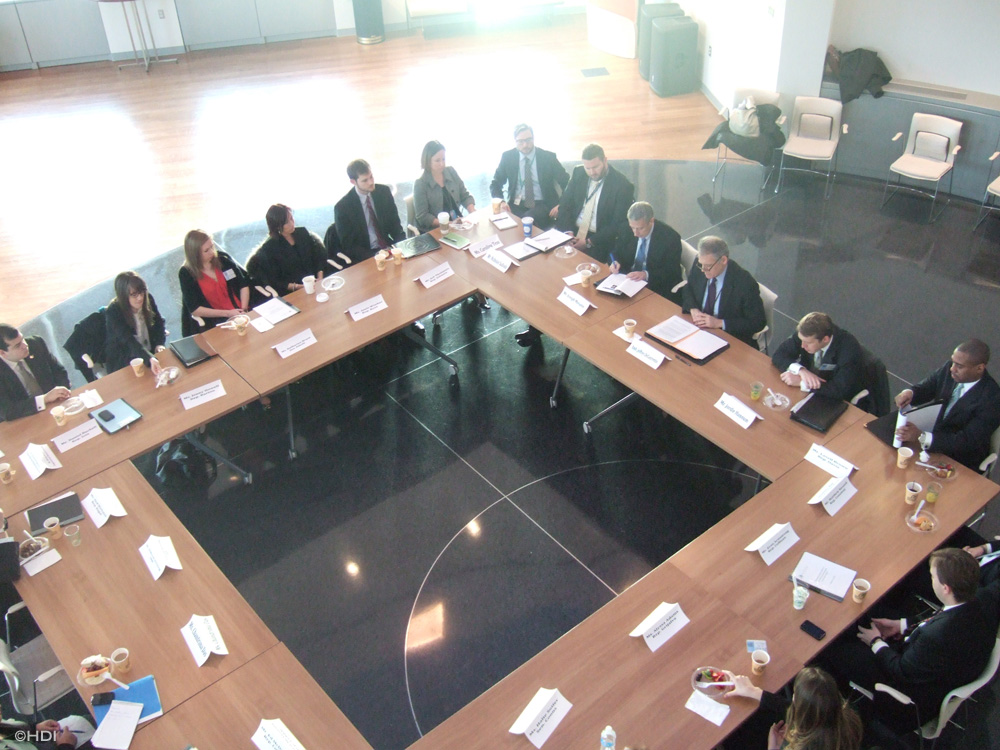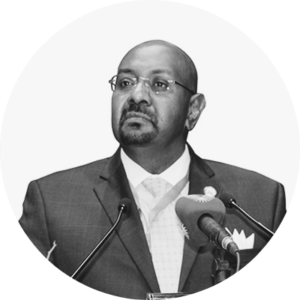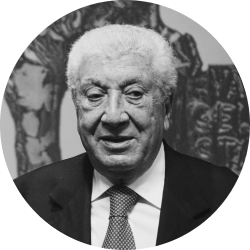The Humpty Dumpty Institute hosted its 43rd Congressional Staff Delegation to the United Nations (see participant list) on January 18. The delegation focused on the current crisis situations in the countries of Mali and the Democratic Republic of the Congo and the response of the United Nations.
As is tradition for The Humpty Dumpty Institute Congressional programs, the first event of the day was a working breakfast hosted by the United States Mission to the United Nations (USUN). Jeffrey DeLaurentis, U.S. Ambassador and Alternate Representative for Special Political Affairs, discussed how the United Nations advances the U.S. goals of preventing conflict, keeping the peace, and advancing human rights. He also explained how the United States is supporting the international community in restoring the democratic process in Mali, creating a road map for free and fair elections in that country, and establishing credible negotiations between the Malian government in Bamako and responsible opposition leaders in the northern part of the country.
Following the breakfast the delegation went to the United Nations where Assistant Secretary General for Strategic Planning Robert C. Orr began the U.N. program. Dr. Orr discussed the accumulation of stresses on the international system and the resulting slow down on economic growth which is putting U.N. global poverty reduction at risk. He also addressed the belief by many in Congress that the U.N. is wasteful. Dr. Orr explained how the United Nations is successfully doing more with less by creating regional hubs and maximizing the use of technology. Dr. Orr also stressed that the work of the U.N. is an extremely good value for the United States. He detailed how United Nations program effectively promotes U.S. based values and the enormous impact the U.N. makes with very little money. He further explained that if the U.N. were not to undertake activities such as peacekeeping, many of them would fall to the United States, at a high cost in resources and lives.
The delegation next received a joint briefing from Philippe Lazzarini, the Deputy Director of the Coordination and Response Division, U.N. Office for the Coordination of Humanitarian Affairs and Joao Honwana, Director of Africa II Division, Department of Political Affairs Mr. Lazzarini and Mr. Honwana discussed the crisis in Mali from humanitarian and political perspectives. The crisis in Mali, a country the size of Texas, resulted after arms and soldiers flooded into the country from Libya after the fall of Colonel Gadaffi. Mr. Honwana explained that without the French intervention in Mali, the entire country would have fallen and become a terrorist base. Mr. Lazzarini ended by saying that the goals of the U.N. are now to prevent the rebel groups from taking up residence in a different country after they are defeated in Mali, and to provide humanitarian assistance to the inhabitants of northern Mali and the entire Sahel region.
U.N. Under Secretary-General for Peacekeeping Operations Herve Ladsous gave the final briefing of the morning session. Ambassador Ladsous presented an overview of U.N. peacekeeping operations highlighting the fact that over the last 65 years the United Nations has conducted 60 peacekeeping operations. The Under-Secretary General expounded on how peacekeeping operations are partnerships between the U.N. Security Council and the member states which supply the troops. The Congressional staffers asked how these operations benefited the United States and their cost to the U.S. taxpayer. Ambassador Ladsous replied that although the United States pays 27% of the cost of the total peacekeeping budget, this is significantly less than if the United States were to intervene even in only a small percentage of the countries where U.N. peacekeepers operate.
The delegation then toured the United Nations Secretariat and General Assembly buildings to review the state of the current renovations. This was followed by a working lunch with representatives of a dozen African countries. Ambassador Ignace Gata Mavita, the Permanent Representative of the Democratic Republic of the Congo addressed the group and gave his country’s perspective on the current crisis. The Ambassador commented on the report that the DRC mission prepared for the delegation participants which included the historical perspective of the conflict, humanitarian ramifications, role of natural resource exploitation, and political and diplomatic efforts to end the conflict in the DRC. He was followed by Ambassador Thomas Mayr-Harting, the Permanent Observer of the European Union to the United Nations. Ambassador Mayr-Harting stressed the dangers of the cross-border contagion of drug trafficking and terrorism. He said that the EU plays an important role in working with the international community on transnational crime. French Deputy Permanent Representative, Mr. Martin Briens, was the next speaker and he discussed the current French intervention in Mali. Mr. Briens highlighted the current effort to stop the advance of terrorist groups operating in the Sahel region and emphasized the need for inter-African cooperation on this issue.
Participants:
Ed McDonald, Chief of Staff, Congressman Howard Coble (R-NC)
Amie J. Woeber, Legislative Director, Congressman Dennis Ross (R-FL)
Halie Soifer, Foreign Policy Advisor, Senator Christopher Coons (D-DE)
Lavell Brown, Legislative Assistant, Congressman Danny K. Davis (D-IL)
Evan Armstrong, Legislative Assistant, Congressman Mike Coffman (R-CO)
Matthew Russell, Legislative Assistant, Congressman Michael Conaway (R-TX)
Don Bergin, Legislative Assistant, Congressman Michael Turner (R-OH)
Alyssa Adams, Legislative Assistant, Congressman Raul Grijalva (D-AZ)
Jett Thompson, Legislative Assistant, Congressman Sam Johnson (R-TX)
Katharine Bruce, Legislative Correspondent, Senator James Inhofe (R-OK)
Jenny Howell, Legislative Correspondent, Congressman Joe Barton (R-TX)
Daniel Bucheli, Congressional Aide, Congressman Darrell Issa (R-CA)
Ned Michalek, Administrative Assistant, Congressman Eliot L. Engel (D-NY)
Rhoda Margesson, Specialist in International Humanitarian Policy, Congressional Research Service
Deborah DeYoung, National Information Officer, United Nations Information Center
Funding for this program has been provided by the United Nations Foundation
For more information, please contact Boris Shapoval at boris.shapoval@thehdi.orgAll Humpty Dumpty Institute’s organized Congressional travel is approved by the Ethics Offices of the U.S. House and the U.S. Senate and follows all guidelines for travel by USG employees as prescribed by U.S. Department of State regulations.























